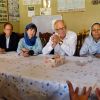“Our programme is ‘Together First’”
How can crises be permanently overcome? What role does multilateralism play? An interview with Christoph Heusgen, Germany’s ambassador to the UN.

Climate change, migration and disarmament – many issues can only be solved by crossborder cooperation. Christoph Heusgen, Germany’s Permanent Representative to the United Nations in New York, talks about the importance of multilateralism today and ways of overcoming crises on a lasting basis.
Ambassador Heusgen, Germany became a member of the UN Security Council again at the beginning of 2019. Do the people there feel that the United Nations is currently under pressure from various quarters?
Yes and no. Although you might perhaps not expect it, there is a positive mood among colleagues on the Council. We are also able to calmly discuss critical issues and attempt to find appropriate solutions. On the other hand, of course, geopolitical tensions are also reflected in the Security Council. In the Ukraine conflict or on Venezuela, for example, it is currently difficult to make progress because of major differences of opinion.
At the moment, the USA in particular has a very critical attitude towards the principle of multilateralism. We were able to observe that once again recently at the Munich Security Conference. How does that manifest itself in concrete work at the UN?
The USA has a critical view; that is correct. And this also manifests itself at the UN: for instance, withdrawal from the INF Treaty, departure from the climate agreement and non-participation in the Global Compact for Migration, to name just a few examples. The Trump administration has a significantly different view of the UN from that of the Obama administration.
Does that constitute a definite turning away from the UN?
No. On the one hand, the Americans disregard UN resolutions when they withdraw from the nuclear agreement with Iran, for example, or when they move the US Embassy from Tel Aviv to Jerusalem. On the other, however, they are also very interested in multilateral solutions, for example, on sanctions against North Korea. We try to convince our American colleagues that it’s in their own long-term interests to comply with all international rules, that the world simply functions better within a rules-based order, and that conflicts can then be more easily defused.
What are other countries doing? Are we now experiencing something that could be described as a return to nationalist times?
That’s not how I would put it. Nevertheless, we can already see how various countries in the UN are again placing greater emphasis on national sovereignty and how thinking in national categories is increasing. Especially China and Russia, for example, are increasingly pursuing their own interests. Nonetheless, the UN is not at issue as an institution. On the contrary, it continues to be the most important global political body. Consider the Sustainable Development Goals, or SDGs, that have laid out a roadmap for the future of our planet. Consider climate change or global movements of migrants. These are all issues that could not be resolved without the UN.
We in the Security Council want to focus on crisis prevention.
What are Germany’s goals for its two-year term on the Security Council?
We want to focus on crisis prevention, because prevention is always better than trying to put the pieces back together again after they’re broken; disarmament is also crucial to banish the threat of a new arms race. And we are focusing on human rights because conflicts frequently arise when they are disregarded. Action to prevent sexual violence against women in conflicts is also important to us; this subject is often completely underestimated. When you see how it is systematically used as an instrument of war – in South Sudan, in Congo or, for example, in Myanmar – the subject suddenly gains security policy relevance. We would like to draw attention to its significance.
Prevention, disarmament, human rights and sexual violence against women – are there even more topics on your agenda?
Yes, climate protection, because climatic changes can also constitute a security risk. We are already able to see this in the Sahel. People there are migrating from dry areas to other regions where conflicts then arise over water and land. And yet, the global increase in temperature is only just beginning.
Will Germany be taken seriously with this softer agenda?
We are concerned about a broader concept of security here, because in the long run we can only overcome crises if we address their causes, and they are often associated with human rights violations and poverty. We believe that logic is on our side.
How precisely will you make your points?
Above all, we will use the time of our Security Council presidency. It rotates between the members in alphabetical order on a monthly basis. It is our turn in March and April. To be more precise, we are engaging in a double presidency with France, as we happen to be in charge of the proceedings on the Council on two immediately following months. That is when you can present the work schedule and put your own topics on the agenda. However, we will also attempt to direct attention to our key goals at other times outside these two months.
And you are in total agreement with France on this strategic direction?
Cooperation between our two countries has always been very close at the UN. And we developed the idea of a joint presidency while we were preparing for our non-permanent membership. That has never been done before in the UN and is a strong
symbol of an institutionalised partnership.
What about traditional conflict resolution? Where and how will Germany play a role here?
We play a role in all conflicts. We are involved with regard to Ukraine, Syria, Yemen and North Korea, to name just a few; in the latter case, we even chair the important Sanctions Committee. Furthermore, Germany is the world’s second largest donor when it comes to humanitarian assistance.
Does that also entail playing a larger role in UN peacekeeping missions, as is repeatedly demanded at the international level? Not least of all, the USA would like Germany to spend more money on defence.
I consider that view to be too narrow. We are not only focusing on the 2% target, which stipulates that 2% of gross domestic product (GDP) should go on defence. Development cooperation also contributes to security and stability. The so-called ODA quota, which says that 0.7% of GDP should be spent on official development assistance, has also been agreed by the international community. We meet this quota, the USA does not; its quota is roughly 0.18%. Conflicts cannot be resolved by military means alone. And I consider it very level-headed and very understandable that Germany should show a little more restraint in the military field as a result of its history.
Multilateralism is more important than ever in this era of globalisation.
Does that also apply to Africa where most UN peacekeeping missions are currently taking place?
I do not believe that there is a future in dispatching thousands of Bundeswehr soldiers to South Sudan, Congo or Somalia. Instead it must be our goal – not only as Germany, but also as the EU – to strengthen local troops. We want to support the African Union in solving the conflicts on its own continent itself.
However, even now, Africa does not have a permanent seat on the Security Council. What’s the state of the reform that’s been under discussion for a good 20 years? Is the effort still worth it?
Definitely. If we value the UN, we should strengthen its legitimacy. The current composition of the Council no longer reflects the reality of our world. Primarily, that involves the 54 African states that do not have one permanent seat. However, other actors are not appropriately represented either.
Is Germany maintaining its aspiration of a permanent seat, although things have more or less come to a standstill here?
We still firmly believe in it and have formed an interest group together with Brazil, Japan and India. It is correct, however, that progress has currently stalled. Certain countries are blocking movement on this question. In first place here is China, which thwarts even the smallest advances and is fundamentally against any kind of reform. Nevertheless, it is worth keeping up the effort.
What do you need to accomplish to be able to draw a positive balance after two years on the Security Council?
We have defined our goals, which I have already outlined. Of course, whether we achieve anything, does not only depend on us, but also very strongly on the geopolitical situation. That’s why it is important for us to be able to say afterwards that we did everything in these two years to support our goals and values and to present ourselves as a strong representative of multilateralism.
Federal Foreign Minister Maas presented his address to the General Assembly in autumn 2018 under the slogan “Together First”. Is that also your motto for the time on the Security Council?
That’s more than a slogan. It’s our programme; it is based on the firm conviction that the challenges of our world can only be mastered by working together. The concept of multilateralism becomes more important than ever in times of globalisation.
Interview: Friederike Bauer
You would like to receive regular information about Germany? Subscribe here:


